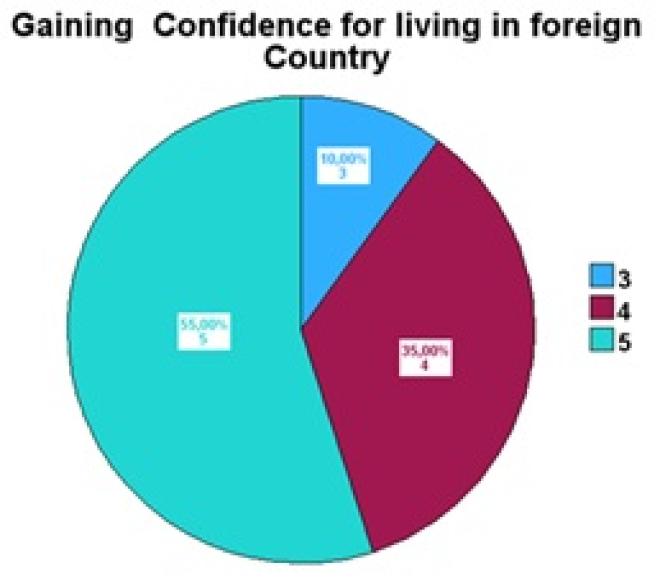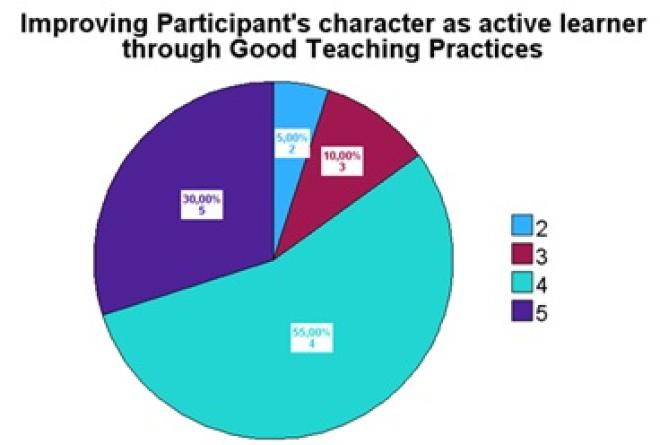Assessment ( Greek Students )
ASSESSMENT of the Greek students' participation in the ERASMUS+ "E.A.R.T.H" Project.
After the last LTTA the Greek students were asked to complete a Questionnaire for the Programme Assessment.
The questionnaire was prepared by the Greek Teachers who participated in the ERASMUS+ "E.A.R.T.H" Project.
Completing the Questionnaire, the students used the format of a typical five-level Likert scaling
1.Strongly disagree,
2.Disagree,
3.Neither agree nor disagree,
4.Agree,
5.Strongly agree
At every question has been also computed the arithmetic mean which represent the average of the score.
The effects of the Greek students' participation in the ERASMUS+ "E.A.R.T.H" Project are as follows:
Ε1. Communicating in English and cooperation with other European students and citizens has increased as shown in the illustration of the relevant question (Mean 4,35/5 and 4,65/5). Of course, the different accent of European pupils and their knowledge of English should be taken into account.
Ε2. Gained confidence for possible future living in a foreign city away from their family and helped participants to overcome possible fears particularly of travelling by air (mean 4,35/5).
Ε3. Improved the participant's character as an "active" learner through good teaching practices and the use of new technologies (mean 4,10/5).
Ε4. Improved the participant's character as a proper and 'active' European citizen and enabled them to face future challenges within the European Union (mean 4,25/5).
Ε5. "transferred" ideas and knowledge by staying in a European city and promoted environmental protection will improve the living conditions of the inhabitants in their city and in Greece in general (mean 4,40/5).
Ε6. Got to know another European Country and City, its history and culture, the way of life and the mentality and behavior of its inhabitants and living with foreign students (mean 4,75/5).
Ε7. Promoted their Country, City and School to the other European participants through presentations, communication and visiting our City, the local business activities as well as the cultural heritage sites and sights of their Country (mean 4,65/5).
Ε8. Increased the participants' knowledge of modern technologies and entrepreneurship (the main subject of the Project), new practical teaching and general training in new areas of knowledge (mean 4,40/5).
Finally,participants through the questionnaires suggested increasing mobility and holding more workshops
While, the absolute total of participants would encourage a classmate or young friend to participate in an ERASMUS+ Project,
highlighting the knowledge, experiences, skills that can be gained.
Important Conclusions from the Questionnaire responses.
1. The good knowledge of English helped the students to avoid problems (more than 85%) of communication and cooperation with students from other European Schools and to cope with the participation in the "workshops".
2. Participation in the ERASMUS+ Programme:
- Increases the possibility of communication within the European Union and cooperation in multinational groups (90% of students).
- Increases the participants' confidence in future living and working in Europe (90% of students).
- Reinforces the participants' attitude and character as 'active' learners and European citizens (95% of students).
- Increases the possibility of transferring "good" ideas and knowledge of living and environmental protection from the cities and States where the mobility takes place to our country in order to improve the living conditions of the inhabitants (95% of students).
- Enables students to get to know European cities and countries, and in addition, through presentations and projects, to promote our Country, our City and our School, as well as its business opportunities, the cultural heritage monuments and the sights of our Country (over 95% of students).
- Increased the participants' knowledge of modern technologies and entrepreneurship (the main subject of the E.A.R.T.H. Programme), new practical teaching methods, the use of educational software tools and general training in new knowledge areas (over 85% of students).
3. The "absolute" total of students, appreciating the benefits of the ERASMUS+ Programme they participated in, would encourage a classmate or young friend to participate in ERASMUS+ Programmes, highlighting the knowledge, experience, skills they can gain.
4. An important percentage of students (95%) suggested increasing mobility in the Programmes and increasing the number of assignments and "workshops".













